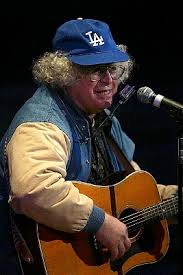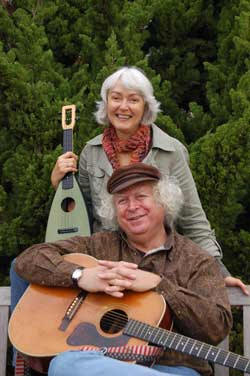

ROSS ALTMAN: FOLKSINGER, SONGFIGHTER
“Ross Altman is probably the most prolific, literate, experienced, politically active, and excellent topical singer/songwriter in Los Angeles today. With a Ph.D. in English literature, he traded his professorship for a life as a political folksinger and music historian of left movements. If there’s been a cause that needed a song, Ross has been on the spot with lyric and tune. Writing in traditions ranging from Woody Guthrie to Tom Paxton, this “singer-songwriter’s” songs always have something to say.”
Ross “left teaching for the stage, only to turn the stage into a classroom.”
As a folksinger, he continues in the tradition of Woody Guthrie to “comfort the afflicted, and afflict the comfortable.”
Los Angeles Times ~ May 23, 2005
Hillbilly hootin’ and hollerin’ and other joyful American noises
by Al Martinez
I heard America singing on a Sunday as bright as heaven, and it was a unifying experience. The history of the country was laced into a musical blowout that was part hoedown and part hootenanny called the Topanga Banjo Fiddle Contest & Folk Festival.
Paramount Ranch was turned into the kind of picking, plucking, strumming celebration of cowboys, railroads and wagon drivers that made you want to get up, wave your 10-gallon hat and do the two-dog stomp.
The music was mostly down-home, bluegrass, country and western, and rockabilly, but there were folk tunes too that told stories about times of need and anger in America and helped define in verse and melody who we are and why.
I try to avoid crowds and figured there’d be hundreds at the ranch pushing and shoving and causing me to curse and fight and maybe instigate a riot that would bring out armies of sheriff’s deputies who’d beat us with truncheons and pump 500 bullets into a guy with a violin that they mistook for a hand-held missile launcher.
But it wasn’t that way at all.
“Must you always expect the worse?” Cinelli said, leading us through a happy, orderly crowd toward a stage where a trio was pluckin’ its hillbilly heart out. Across an open field of picnickers, dancers were stomping and twirling in the buttery sunlight.
People were actually happy. How odd.
We had our friends Jeffrey and Joshua with us. Jeff is 12 and one of the sweetest, smartest kids you’d ever want to meet. He says “please” and “thank you” and laughs a lot, except when he’s aiming to beat your brains out in a game of handball. Joshua is a funny, determined 4-year-old going on 32 who will either one day rule the world or punch it flat out in the face. He speaks in full and elaborate sentences and sometimes gestures broadly so you’ll be sure to get his point. I see him as Senate majority leader someday.
There were clusters of balladeers here and there outside the performance stages. Amateurs and professionals gathered with their guitars or fiddles under oak trees as old as summer and made music, not for prizes or applause but just because they loved doing it.
The whole jamboree is called the Topanga festival, by the way, because that’s where it started in 1961, in a private home. Now it needs the wide fields and rolling hills near Agoura to facilitate huge crowds drawn to the kind of music that was once sung around campfires and in covered wagons rolling toward the future.
I heard America singing at a stage devoted to folk music, where a troubadour named Ross Altman was performing. With bushy white hair and a pink face, he looked a little like a Santa Claus for the left, offering songs of hope and despair in the kind of gentle, nonthreatening tones that folk singers have perfected.
Drawing on tunes that people like Pete Seeger and Woody Guthrie wrote, and Arlo Guthrie and Bob Dylan after them, Altman sang of hungry times in America, of “beans, bacon and gravy,” and of the scary days of blatant racism and national paranoia that vilified the black singer-actor-activist Paul Robeson.
Folk music is rooted in protest, but there’s also a redeeming glory to it. When Altman sang “This Land Is Your Land,” everyone joined in, those who found seats at a venue called the Railroad Stage and those passing by who sensed the joy of the music that Woody Guthrie wrote when he was guitaring across the country, and that Walt Whitman encapsulated in poetry long before him when he heard America singing.
I looked around and wished I could translate the beauty of that moment and that tune into something that would regenerate a mood of benevolence “from the redwood forests to the Gulf Stream waters” and enhance a realization that we’re all one, not only in our expanse of mountains and rivers but on the whole of this little blue ball in space. Jeffrey sensed the moment and listened intently, Joshua beat out a rhythm with two sticks.
Altman was born in L.A. 58 years ago. He’s been singing all of his life and, after earning a PhD in modern literature and teaching for years, he decided to make his living as a balladeer. His father was a lawyer, George T. Altman, whose career was almost destroyed by the old House Un-American Activities Committee because of his involvement in politics. It didn’t take a lot in those days to be called a communist.
You could sense history in Altman’s music, both the joy and longing of a people struggling to exist, addressed in a folk singer’s lyrics. When everyone sang with him about America, they were singing to one another, not just about mountains and rivers but about freedom and goodwill. I thought about that later as I watched Altman making his way alone across a dusty field, somehow epitomizing us all. I could still hear the music.
